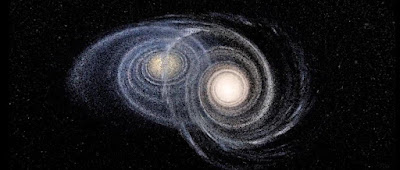
I shall call this post an exploration—a survey. Is mathematics, as Galileo Galilei described it, ‘the language in which God has written the universe’? Are the numerical features of the world, in the words of the authors of the Collins Dictionary of Philosophy, Godfrey Vesey and Paul Foulkes, ‘free from the inaccuracies we meet in other fields'? Many would say yes—however, there are things which give us pause for thought.
- Sometimes reality may be too complex for our mathematics to apply. It is impossible to calculate in advance something as simple as the trail of a snail on a wall. Stephen Hawking noted, 'Even if we do achieve a complete unified theory, we shall not be able to make detailed predictions in any but the simplest situations.' If we do try to do so, therefore, we abuse mathematics—or perhaps we should say, in many contexts, mathematics fails.
- Our measurement of the world may be inadequate to the task—in varying degrees. I take a ruler, and draw a line precisely 100 mm in length. But now I notice the grain of the paper, that my pencil mark is indistinct, and that the ruler's notches are crude. In many cases, mathematics is not the finest fit with the reality we deal with. In some cases, no fit at all. I measure the position of a particle, only to find that theoretical physicist Werner Heisenberg was right: I have lost its velocity.
- The cosmologist Rodney Holder notes that, with regard to numbers—all numbers—'a finite number of decimal places constitutes an error'. Owners of early Sinclair calculators, such as myself, viewed the propagation of errors in these devices with astonishment. While calculators are now much refined, the problem is still there, and always will be. This error, writes Holder, 'propagates so rapidly that prediction is impossible'.
- In 1931, the mathematician Kurt Gödel presented his incompleteness theorems. Numbers systems, he showed, have limits of provability. We cannot unite what is provable with what is true—given that what this really means is, in the words of Natalie Wolchover, ‘ill-understood’. A better known consequence of this is that no program can find all the viruses on one’s computer. Consider also that no system in itself can prove one’s own veracity.
- Then, it is we ourselves who decide what makes up each unit of mathematics. A unit may be one atom, one litre of water, or one summer. But it is not that simple. Albert Einstein noted that a unit 'singles out a complex from nature'. Units may represent clouds with noses, ants which fall off a wall, names which start with a 'J', and so on. How suitable are our units, in each case, for manipulation with mathematics?
- Worst of all, there are always things which lie beyond our equations. Whenever we scope a system, in the words of philosophy professor Simon Blackburn, there is 'the selection of particular facts as the essential ones'. We must first define a system’s boundaries. We must choose what it will include and what not. This is practically impossible, for the reason that, in the words of Thomas Berry, an Earth historian, 'nothing is completely itself without everything else'.
- I shall add, myself, a 'post-Gödelian' theorem. Any and every mathematical equation assumes that it represents totality. In the simple equation x + y = z, there is nothing beyond z. As human beings, we can see that many things lie outside z, but if the equation could speak, it would know nothing of it. z revolts against the world, because the equation assumes a unitary result, which treats itself as the whole.
Certainly, we can calculate things with such stunning accuracy today that we can send a probe to land on a distant planet’s moon (Titan), to send back moving pictures. We have done even more wonderful things since, with ever increasing precision. Yet still the equations occupy their own totality. Everything else is banished. At what cost?